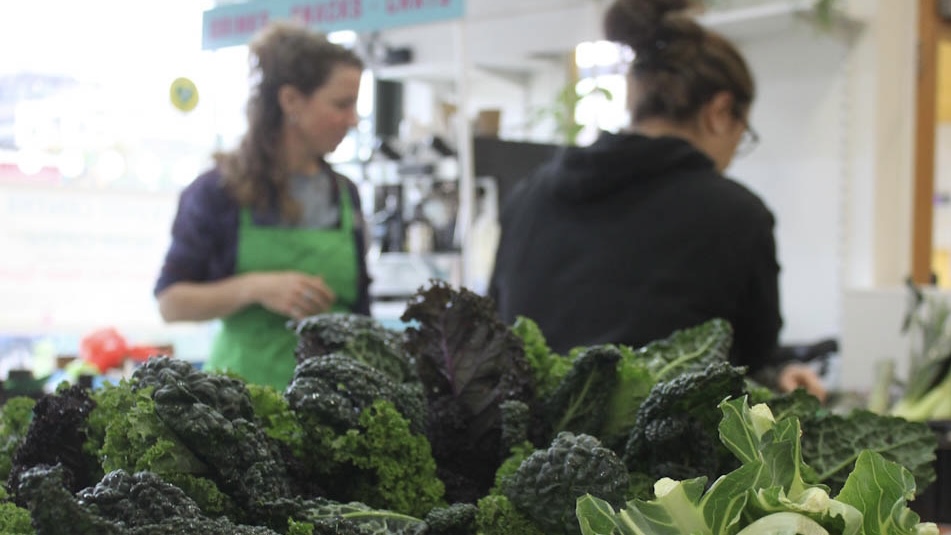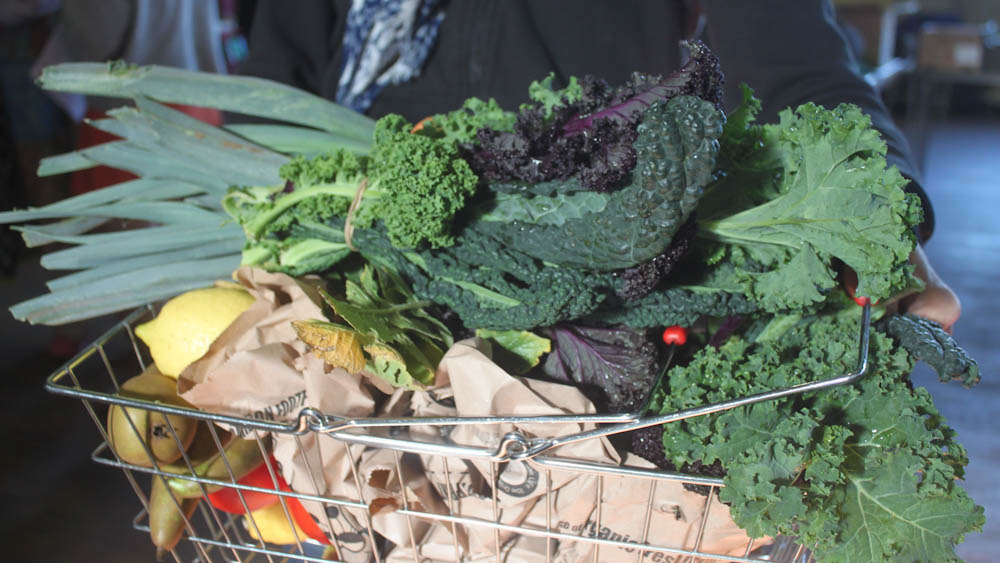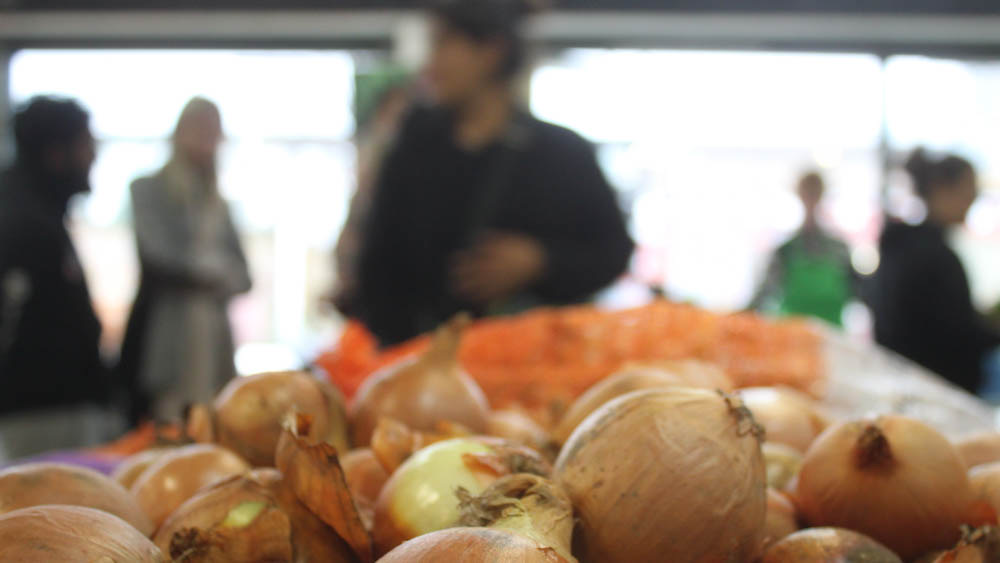With the cost of living crisis and climate emergency, how can we make organic food more available to people through local retail?

Head to Cardiff Farmers Market in the winter months and you will struggle to find a punnet of strawberries for your cheesecake. Kale, potatoes and Granny Smith apples will be abundant but if you want summer fruits in the coldest months, you need to head to your local supermarket.
But if you really have your heart set on making that pudding, then the strawberries you buy are likely to have been grown thousands of miles away in southern Spain or Northern Africa and transported in environmentally unfriendly ways and come with a host of chemicals.
It’s a problem that has been bothering Carol Adams who runs the farmers market and believes that locally bought produce has an improtant role to play in tackling the climate crisis.
“Our main challenges include finding farmers who will sell vegetables all year round and persuading them to commit to weekly farmers’ markets. The other challenge is sourcing organic, culturally appropriate produce to meet consumer demand consistently,” said Carol Adams, the manager of Cardiff farmers markets.
Local retail is essential in making organic food accessible. This is in contrast to large supermarket chains in the current food retail landscape. The sector includes inherently organic retail outlets such as farmers’ markets, as well as independent retail formats such as convenience stores.
While inherently organic retail often offers a diverse range of organic products. “However, it can face challenges in terms of physical and financial accessibility.
On the other hand, independent retail, which caters to a wider audience, often does not have a fully dedicated organic offer, creating a gap in the market for those seeking sustainable food options,” said Rachel Jones the local food coordinator at an organization aiming to promote sustainable food systems.
In addition, the food retail industry faces a significant challenge from the overwhelming dominance of big supermarket chains, which account for 96% of the food retail market share.
Typically, they offer only a limited range of organic products that are small and niche, and they make minimal efforts to improve the accessibility or affordability of these options.
Many organic products now have price parity with non-organic alternatives. This missed opportunity for supermarkets to cater to the growing demand for sustainable food is particularly striking.
Therefore, there is a need to make organic food more accessible through local retail. As larger retailers slowly adapt to the increasing demand for organic food, local independent retail offers a promising opportunity for change.

To meet these challenges and move towards a more sustainable food system, a major change in food retailing is needed. Rachel said, “The goal is to increase the retail market share for better, more sustainable food to 10% by 2030.”
Other challenges faced by local retailers is on the demand side. “One problem is the pervasive skepticism or misunderstanding of marketing strategies, particularly when it comes to selling food from a non-commercial retail perspective,” said Julia Smith from the Better Food Traders.
“We need to cultivate demand to achieve a larger scale, ultimately rendering organic food accessible, affordable, and the norm,” she said.
“Products must align with people’s needs and desires, such as taste, convenience, cost, and culture. In selling local organic produce, we must ensure it’s perceived as delicious, easy to prepare, and offers good value, all the while resonating with people’s values and cultural preferences,” Julia said.
The good news is that Cardiff Farmers Markets have implemented innovative strategies to complement the offerings of individual farmers. This ensures a continuous supply of organic produce and addresses gaps in the availability of certain items.
“We have partnered with another social enterprise to act as a green grocer for the farmers’ market. Anything leftover from the Sunday market goes to the Monday market for the community where they’re selling,” Carol said.
To get healthy and organic food for a lower price, consumers can buy locally through a short supply chain, such as a local veg box scheme or farmers’ market. Another option is to buy in season, as organic local produce is often similarly priced to chemically grown produce.

Convenience stores play a crucial role in local communities as key access points for organic and locally sourced food. According to James Lowman, the chief executive of the Association of Convenience Stores.
There are nearly 50,000 convenience stores in the UK, making their reach into communities unparalleled across every business sector. This unique capacity can positively influence local food systems.
Specifically, during covid-19 pandemic, the importance of local businesses increased significantly. Many local shops experienced a increase in sales. The convenience stores were adaptable and community-minded, meeting the needs of the local community during these unprecedented times.
In order to make products more popular, James said, “Promotions is an useful tool to share the risk between the retailer and the consumer, which could help build demand and volume for organic products.”
Additionally, he stresses the significance of creating more direct supply chains, where local retailers could sell organic products directly to customers by hosting events or setting up stalls outside their stores.
However, there is no single solution, it will also take a raft of policy changes to effectively bridge the gap.
To encourage UK farmers to diversify their crops, including culturally relevant ones not traditionally grown in the UK, the government should provide research support and subsidies. This could help reduce the risks associated with growing new types of vegetables.
Additionally, the government needs to invest in infrastructure that supports local and organic food markets. Julia suggested creating tangible changes in local food systems, such as food hubs and green grocers.
To improve the availability of organic food, the government should facilitate the connection between local suppliers and retailers. “Policies that promote local sourcing and reduce barriers for small producers to enter the retail market could have a significant impact on the availability of organic food,” James said.
“We need to create products that meet customers’ needs. People might prefer weighed veg to a veg box. Maybe they want home delivery because they’re in a rural area. Maybe they want a farmers market because they enjoy that experience. But perhaps they wish they could buy dry goods, toilet paper cleaning supplies there too, so they wouldn’t then have to go make a trip to the supermarket. So we really need to think hard about products with a customer centric approach,” Julia said.
